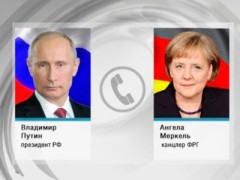“Prava Ludiny” (human rights) monthly bulletin, 2014, #06
Whose anti-Semitic and Homophobic Choice? Empty ‘positive signals’ used to justify another western cave-in over sanctions What should they talk about, Mr Putin? Russia’s Nationalist Fringe Takes Center Stage In Eastern Ukraine The right to life
Ongoing harassment of ethnic Ukrainians, Crimean Tatars & others in Crimea The right to liberty and security
KHPG calls for evacuation measures from ATO-affected areas The right to a fair trial
Russia’s FSB launches first Crimean show trial Freedom of conscience and religion
FSB looks for ‘extremists’ in a Crimean school Freedom of expression
Kaliningrad FSB finds ‘deep offence’ in a German flag Cynical propaganda mileage from journalist’s death The right to health care
Crimea’s Methadone Ban hits Rehabilitation Patients hard On refugees
KHPG statement on the adoption of a law on internally displaced persons Law on Internally Displaced people comes in for criticism Help for Forcibly Displaced People
Politics and human rights
Whose anti-Semitic and Homophobic Choice?
How divided Ukraine is arouses endless debate, yet it is the West which at present is appearing positively schizophrenic. Take German chancellor Angela Merkel’s interest in giving Viktor Medvedchuk official status at peace negotiations. This is undoubtedly the Kremlin’s choice, however why the leader of a party with apparent anti-Semitic leanings and a pronouncedly homophobic position should be the EU’s is less clear.
Medvedchuk was one of the first people against whom the USA imposed sanctions back on March 17 “for threatening the peace, security, stability, sovereignty, or territorial integrity of Ukraine”. He is also targeted for having “materially assisted, sponsored, or provided financial, material, or technological support to Yanukovych”. Ex-president Viktor Yanukovych who is in hiding in Russia, is generally believed to be playing a major role in the present unrest in Donbas. Medvedchuk’s party or its members are considered by the US to be undermining democratic processes in Ukraine.
They are also giving freedom of speech a bad name with a site that posts appallingly anti-Semitic articles. A particularly extreme example from 10.12.2013 was entitled “Jews, Jews, there are Jews everywhere” (A screen shot can be found here ). The author, Yevgeny Barannik unfortunately saw the need to express the view that all power in Ukraine is held by Jews, and “the whole opposition in Ukraine is also Jewish despite some exotic surnames”. In true Soviet style, the author then ‘exposes’ the Jewish surnames of certain opposition figures or or their grandparents.
After an article entitled “Viktor Medvedchuk’s anti-Semitic Choice” condemned the text, it disappeared. This is despite the attempt by Yelena Markosyan, regular author and apologist for Medvedchuk to claim that the party was simply defending freedom of speech and that anybody can put what they like on the site.
Some people certainly do, and this is by no means the only anti-Semitic material which can still be found on the site (see, for example, the text here).
The claim, however, that the site is an ideological free-for-all is far from the truth. This is evident simply from the ‘news’ presented. The site reports the opening of a photo exhibition ‘Odessa Tragedy’ in Hungary and India aimed at fighting the ‘muffling’ of information about the ‘fascist attack on anti-Maidan demonstrators and how they killed people’. This version of the tragic events of May 2 is also at variance with the report presented by the UN High Commissioner for Human Rights, but gels completely with the line taken by the Kremlin and most Russian media. The site reports a statement by European Parliament deputies proposing to postponing the signing of the EU-Ukraine Association Agreement; claims that the Red Cross has recognized the Kremlin-backed militants’ self-proclaimed Donetsk People’s Republic to be a party to the military conflict; and that the US State Department supports the party ‘Ukrainian Choice’’s idea of federalization.
All of this and more is similar to what one finds on Kremlin-loyal Russian media. The homophobic views, seen in the billboard here in which the party ‘warns’ that “EU Association = single-sex marriages” are also actively pushed by Russian politicians and seen in the scandalous law in Russia against what is called ‘promoting homosexuality’. Medvedchuk’s party’s strong anti-EU position and support for Ukraine’s so-called ‘federalization’ are also found not only in mainline Russian media but in the public statements made by the Kremlin’s far-right friends. Marine le Pen, for example, leader of the anti-immigrant, anti-Semitic and homophobic French National Front, expressed her belief that Federalization of Ukraine is wisest and most balanced solution during a meeting this April with Russian parliamentary speaker Sergei Naryshkin.
Russian President Vladimir Putin has found nothing jarring about the anti-Semitic views of his close friend Medvedchuk’s party, nor those of the far-right militants the Kremlin is backing and providing fighters, surface to air missiles and other sophisticated military technology and arms to in eastern Ukraine.
Western leaders can simply feel discomforted by such views, but should be extremely wary of an overt conflict of interests. Medvedchuk’s agenda is directly that of the Kremlin’s and should not be that of the EU or any member country.
Empty ‘positive signals’ used to justify another western cave-in over sanctions
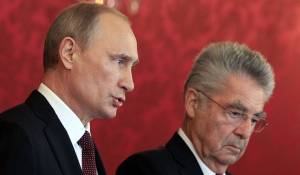
Russian President Vladimir Putin and Austrian President Heinz Fischer during a visit in which Putin received red carpet treatment
Russian President Vladimir Putin is adept at producing fine-sounding words each time sanctions appear to loom. The latest was his announcement on Tuesday, June 24, that he would be ‘asking’ the Russian upper house of parliament to revoke the March 1 resolution which authorized him to send Russian troops into Ukraine. The words prompted upbeat headlines and statements about a ‘thaw’ and ‘breakthrough’. They meant next to nothing, but unfortunately seem to have done the trick. Despite the deaths in two separate attacks of at least 11 Ukrainian servicemen and no evidence at all that Russia is stopping sending fighters, military equipment and arms into Ukraine, Germany’s Chancellor Angela Merkel has warned only that “sanctions could be put back on the agenda”.
Why were they taken off the agenda?
On Wednesday the March 1 resolution was indeed revoked, however headlines like Putin removes threat of military intervention after Ukraine ceasefire and talk of ‘psychologically important progress’ are bafflingly off the mark.
Head of the Russian profile committee on defence, Viktor Ozerov, spelled out the real meaning – or lack of such – himself, saying that the Council of the Federation may once again consider sending troops in if “there is the relevant request from the head of state”.
As we see, this will take less than 24 hours.
Why bother, however, when the formal deployment of troops carries enormous costs, both economic and political, and waging covert warfare is prompting only empty threats?
The missiles which downed a military helicopter on June 14, killing 49 Ukrainian servicemen and crew undoubtedly came from Russia. It seems likely that the same is true of Tuesday’s downing of a Ukrainian military helicopter, killing nine men. Tanks and heavy artillery are flowing into Ukraine, together with fighters. Most are mercenaries, though some have been duped by the Russian media propaganda into believing that they are fighting for a ‘Russian world’, for Russian Orthodox Christianity, against ‘fascism’, etc.
The duping is continuing unabated, and by no means only in the Russian media. Putin’s gesture over revoking permission he was not intending to use in the near future came together with a clear statement regarding Russia’s general position. At a press conference following his red carpet welcome in Austria, Putin stated that: “Russia cannot ignore what is happening in Ukraine and made it clear that Russia would do everything it can to protect ethnic Russians in Ukraine and added that Russia would also protect those who see themselves as part of the broader Russian world. Although he said he hoped that it would not take the army to do that.”
He also effectively justified refusal by the Kremlin-backed militants in the east to lay down their arms.
“ President Putin … brought up several issues which show some of the hypocrisy evident in the Ukrainian conflict by mentioning that the Right Sector and fascist groups in the West took up arms and staged an armed coup and but then they people in the east did the same thing to protect their interests and their lives they were labelled separatists.”
The dishonesty is staggering, however there is no evidence that it was pulled up either by his Austrian hosts or by the press. There is no parity at all between the largely peaceful EuroMaidan protests and the heavily armed militants who have been taking hostages, some of whom have been murdered, and terrorizing the population.
Most importantly NATO, the USA and EU have all recognized that the arms and indeed most of the fighters are coming from Russia. If the supposed ceasefire agreed on Tuesday morning was never enforced by the militants, Moscow bears direct responsibility.
The Russian media however devoted most of their reports on Tuesday to false claims that it was the Ukrainian military who had continued fighting.
One of the most outrageous was the report on LifeNews entitled: “The outskirts of Slovyansk under fire from phosphorous mines” and stating that “the artillery fire is carried out by armed formations under the control of oligarch Igor Kolomoisky”. Kolomoisky is the governor of Dnipropetrovsk whose firm measures from the outset have kept the militants out. The claim about phosphorous, it transpires later in the report, is coming from the militants, however it is not questioned at all.
Quite the contrary. LifeNews reports supposed attacks with the use of phosphorous on June 12. This is unfortunate since the claims then, made also by Russian Foreign Minister Sergei Lavrov, used old video footage from Fallujah [Iraq] in 2004 as ‘proof’.
The thrust from Putin’s press conference in Austria and from the media on Tuesday was that Kyiv is preventing the peace which Russia is doing everything in its power to achieve.
The visit to Austria was a triumph for Vladimir Putin and Forbes reported on Wednesday that the rouble is now where it stood before any unpleasant words about sanctions were spoken.
No real measures to stop the carnage and suffering in Ukraine have been taken. The only response from Russia to the militants’ failure to observe a ceasefire has been to step up attempts to show Ukraine as ‘fascist’ and as preventing the Kremlin’s ‘peace efforts’. Since the Obama administration has just announced that “sanctions aimed at key economic sectors in Russia” may be delayed because of “positive signals” from President Putin, the latter has good cause to celebrate.
Whatever the ‘far-reaching costs’ of Russia’s direct infringements of international law and aggression in Ukraine might have been, the effort required on Russia’s part to avert them is proving pathetically small.
What should they talk about, Mr Putin?
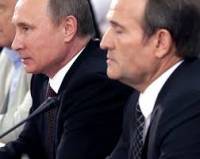
Vladimir Putin’s insistence on ‘negotiations’ with Kremlin-backed militants had appeared merely a ploy for stymying the peace process. Who there was to talk to seemed as unclear as what they had to say. This may have changed with the ‘negotiator’ proposed suggesting a Kremlin-dictated agenda
Over the last two days Russian President Vladimir Putin has expressed ‘support’ for President Petro Poroshenko’s peace plan, while claiming that it must include practical action on “beginning the negotiation process”. On Sunday, he again spoke of ‘support’ while clearly suggesting that the Ukrainian authorities were violating their own ceasefire. He made no mention of the lack of any willingness by the Kremlin-backed militants to join the ceasefire, to stop taking hostages, etc. Nor did he call on them to do so.
The call from Ukraine’s Foreign and Defence Ministry for Russia to support the peace plan in deed, not just words, was echoed on Sunday in a very strong letter to Putin from Ukraine’s first three presidents Leonid Kravchuk, Leonid Kuchma and Viktor Yushchenko. They write that: “in the eyes of the whole planet Russia is turning into a country that you need to defend yourself against and whom it’s impossible to believe. The death toll from this carnage is approaching one thousand. Of course that is nothing compared with the hundreds of thousands of victims of the war in Chechnya which you waged against those same separatists, without any consideration for loss in the name of Russian [territorial] integrity. However then it was an internal matter of your country. Now you have decided to transfer these methods and approaches turned on their heads to our land.”
Since Putin’s words appear at first glance to simply echo the calls from the EU for ‘constructive negotiations’ and ‘political compromise’, it is worth considering his provisos in detail. The peace plan, he says, “should not take the form of an ultimatum to insurgents. The opportunity presented by the cessation of hostilities should be used to start constructive negotiation and to reach a political compromise between the parties in conflict in eastern Ukraine”.
Even if we close our eyes to the overt support which Moscow is giving the militants, it remains unclear which of the ‘insurgents’ Putin is seriously suggesting should take part in this ‘negotiation process’. It is also anything but clear what they can find to talk about.
The militants stated immediately that they would not lay down arms and that they would use any ceasefire for regrouping. Judging by the advertisement reported on the Russian state-owned RIA Novosti, they are also using the time to advertise for mercenaries with skill in driving tanks, etc. No government in the world, least of all Russia, would agree to negotiate with militants who have spent the first two days of the government’s unilaterally declared ceasefire not only fighting the military, but also carrying out reprisals against civilians who tried to get them out of their township.
Is it the leadership of the self-proclaimed Donetsk People’s Republic that Putin wants at the negotiating table? Perhaps the self-styled defence minister Igor Girkin, who goes by the nom de guerre Strelkov. He has been identified by US officials as working for Russia’s GRU military intelligence service, “undermining stability as part of a major Russian covert action program in Ukraine”.
Perhaps if Girkin’s busy on the fighting side, they can talk with the ‘prime minister’ Alexander Borodai who also happens to be from Russia and only appeared on the scene in Donetsk in the middle of May. He is known for his links in Moscow to extreme nationalist figures like Alexander Prokhanov.
There are of course some members of the ‘DPR’ from Ukraine. Pavel Gubarev has been prominent from the outset. His links with the neo-Nazi Russian National Unity party have not prevented him and his comrades from parroting Kremlin rhetoric by presenting the militants as fighting ‘fascism’.
There’s Denis Pushilin, another DPR leader, but here the next problem arises: what there is to discuss. Presumably Putin would condemn insistence that the many hundreds of civilian held hostage be freed immediately as another unacceptable ultimatum, and not ‘constructive’. Pushilin’s statement a day after the May 11 pseudo-referendum that the DPR would be asking to join Russia was watered down in line with Russia’s public statements. DPR leaders have still continued to call for Russian military intervention, and insist that Ukraine is a foreign state to them but the suggestion that they could have a position independent of the Kremlin seems absurd. The DPR’s so-called ‘constitution’ makes it quite clear that if they did come to power, many of Ukraine’s constitutional freedoms would be discarded. These include religious freedom since the DPR recognizes only the Orthodox Church of the Moscow Patriarchate. These are not abstract considerations for the future. Where the militants have seized control, they have terrorized and on many occasions abducted those holding any views they deem suspect, believers of others faiths, journalists, students and any who refuse to accept their rule.
It seems likely, however, that the DPR will increasingly be a front for what it is that the Kremlin is seeking to achieve in Ukraine. One of Moscow’s stated ‘demands’ from the outset has been federalization, and an ominous message on the Russian President’s website late Sunday evening suggests that plans to push for this are now taking entirely tangible form.
The report states that Putin “welcomes information about the beginning of preliminary contact with the leader of the civic movement ‘Ukrainian Choice’, Viktor Medvedchuk in Donetsk and Luhansk”. Medvedchuk is described as consistently supporting the idea of Ukrainian federalization and it is asserted that he “is respected in Kyiv” and known in the West.
“In the course of negotiations with members of the Donetsk People’s Republic, V. Medvedchuk received their consent to a meeting with the OSCE mission on establishing dialogue between Kyiv and the south-east of Ukraine. Russia’s President has repeatedly stated that regulation of the crisis in Ukraine is only possible through peaceful dialogue and taking the interests of the eastern regions of the country into account.
Russia’s repeated calls for Ukraine’s federalization have been widely recognized as an ill-concealed attempt to weaken Ukraine as a state, and to establish firm control over its eastern regions. Medvedchuk is generally believed to have acted as Putin’s representative in Ukraine and played an important role in ex-President Viktor Yanukovych’s rejection of the EU-Ukraine Association Agreement. His ‘Ukrainian Choice’ party is known for such manipulative advertising opuses as a placard on the metro suggesting that European integration spells single-sex marriages.
Medvedchuk was in Moscow with Putin on Nov 22 last year at the very beginning of EuroMaidan. He justified rejection of the association agreement claiming that the country was on the brink of an abyss and could “fall into total dependence, colonial dependence, on the EU’s economy.”. He was convinced that they would cope with EU and opposition “hysteria” “because sober calculation, objective data and what lies at the basis of our countries – Orthodox-Slavonic values, a shared vector of economic, domestic interests, a shared mentality – all of this played a part and all of this won”.
Three months later, EuroMaidan proved Medvedchuk, Yanukovych and Putin wrong with a terrible price paid for that victory. Medvedchuk’s very role in any negotiations would be profoundly offensive to very many Ukrainians. So too is the proposed discussion of federalization and spurious claim that this is in eastern regions’ interests. At his inauguration speech after an unprecedented victory at the first post, President Poroshenko stated clearly that Ukraine’s unitary structure was not up for negotiation. Moscow must not be allowed to use the violence and suffering imposed by Kremlin-backed militants, economic pressure and western reluctance to impose tough sanctions to foist its agenda on ‘negotiations’.
Suspicion is already rife that Russia has played a role in the current scandal in Poland likely to bring down a government that consistently called for a strong position against Russian aggression. Whether or not those suspicions prove justified, Moscow’s tactics in Ukraine should leave no illusions regarding any European country’s security if is not stopped.
Russia’s Nationalist Fringe Takes Center Stage In Eastern Ukraine
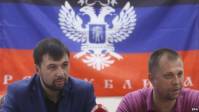
Denis Pushilin (left) and Alexander Borodai
Not long ago, Aleksandr Borodai was a little-known political consultant with nationalist leanings.
Back in 1993, he was among those defending hard-liners barricaded inside the Russian White House in their showdown with President Boris Yeltsin. He wrote regularly for the ultranationalist newspaper “Zavtra” and in 2011 co-founded the "patriotic" online television channel Den-TV.
Despite being a Muscovite and a Russian citizen, Borodai last month was named the de facto prime minister of the self-styled "Donetsk People’s Republic, " a separatist region in eastern Ukraine. The move transformed him from an obscure nationalist on the fringe of Russian political life to a key figure at ground zero of the biggest standoff between Moscow and the West in decades.
And Borodai isn’t the only one making the transformation.
“Yesterday’s marginals are today’s political mainstream, ” said Yevgeny Kiselyov, a Kyiv-based political commentator and television anchor who is originally from Russia.
Kiselyov, who hosted the popular current affairs program "Itogi" (Summing Up) on Russia’s NTV channel in the 1990s before falling out with the Kremlin and emigrating, added that the ideas of once-marginal figures like Borodai and Aleksandr Prokhanov, the editor and founder of "Zavtra, " now make up "the backbone of Russian foreign policy.”
Take Pavel Gubarev, for example. Shortly after he burst onto the scene as the self-proclaimed “people’s governor” of Donetsk in March, 12-year-old photos appeared online of him posing -- in full uniform -- with members of the paramilitary group Russian National Unity.
Writing on Facebook on June 6, Gubarev, a Ukrainian citizen, admitted he was a member of the group, whose symbol bears a striking resemblance to a swastika, thanking it for “military training that you don’t get in the Ukrainian army.”
Russian National Unity is infamous for its attacks on ethnic minorities in Russia and two of its purported former members have been jailed in connection with the 2009 killings of human rights lawyer Stanislav Markelov and journalist Anastasia Baburova. The group was founded by Aleksandr Barkashov, a Russian nationalist who gained notoriety for leading paramilitary units during the October 1993 Constitutional Crisis in Russia.
Back on May 7, just days before the Donetsk and Luhansk regions held unrecognized independence referendums, Ukraine’s security service, the SBU, released what it says wasan intercepted phone conversation in which a man they identified as Barkashov explains to separatist leaders how to falsify the results.
Moreover, Aleksandr Dugin, who in the 1990s preached a Russian nationalism "borderless and red, " spoke in a Skype conversation posted on YouTube with Guberev’s wife, Yekaterina, in late March. The two spoke at length about the situation in the east, a week before gunmen seized government buildings.
The ’Zavtra’ Connection
Several of the Russian nationalists participating in the unrest in Ukraine have links to Prokhanov’s newspaper, "Zavtra."
Both Borodai and Igor Girkin, the self-proclaimed "defense minister" of the Donetsk People’s Republic who goes by the moniker “Strelkov, ” have been regular contributors.
Among those contributors are Sergei Aksyonov, the Moscow-installed prime minister in Russian-occupied Crimea.
Another is Aleksei Khudyakov, the former head of the Russian anti-immigration group Shield Of Moscow. Last year, masked youths from the group raided migrant living quarters in the Russian capital:
Khudyakov was arrested and then released after a storm on the occupied Donetsk regional administration building in March.
"Zavtra" claims it served as a “recruitment point” for Russian volunteers fighting alongside pro-Moscow separatists in Moldova’s Transdniester region in the 1992 conflict.
Analysts suggest that rather than taking the lead in the separatist movement, nationalist groups are instead being recruited and sent by others.
“These links don’t mean that nationalist organizations are playing a significant role, ” said Aleksandr Verkhovsky, head of the Moscow-based Sova Center, which monitors xenophobic attacks and right-wing groups.
“I have the impression that other people are doing the recruiting of volunteers other than the usual suspects in nationalist organizations.”
Moreover, extremist volunteers have not always received a warm welcome from separatists in Ukraine.
Andrei Morozov, who goes by the pseudonym “Murz” and heads the little-known group Red Blitzkrieg, traveled to eastern Ukraine’s Slaviansk to enlist his services last month.
But as Morozov wrote on his blog, separatists mistook him for a spy. They handcuffed him, tortured him, and held him for days before dumping him on Russian territory.
Morozov writes that he was then detained by Russia border guards and made to pay a fine of 2, 000 rubles (approximately $60) for illegally crossing a border.
Nevertheless, the Ukraine crisis has served to bridge the gap between the Kremlin and many of its nationalist critics.
For years, Eduard Limonov has been an arrest-on-sight target for police during street rallies and his "Strategy 31" freedom-of-assembly rallies have long been banned.
But on May 31, the authorities allowed Limonov to hold his demonstration. He returned the favor by giving a speech parroting the Kremlin line that the United States, the European Union, and the authorities in Kyiv were waging war on the Ukrainian people.
On June 10, Limonov’s Other Russia organization called on its volunteers to travel to the eastern Ukrainian separatist stronghold of Slovyansk.
The right to life
Ongoing harassment of ethnic Ukrainians, Crimean Tatars & others in Crimea
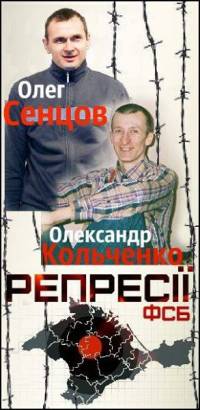 Oleg Sentsov, Alexander Kolchenko - FSB REPRESSION
Oleg Sentsov, Alexander Kolchenko - FSB REPRESSION
In its latest report, published on July 28, the Office of the UN High Commissioner for Human Rights notes that none of its recommendations has been implemented in the Crimea at present under Russian occupation. All issues remain current, in particular “harassment and discrimination against ethnic Ukrainians, Crimean Tatars, representatives of religious minorities, minority groups in general, and activists who opposed the 16 March ‘referendum’ in Crimea”.
It says that as of July 15, 13,381 people had moved from the Crimea and notes that a Crimean NGO, now based in Lviv, believes that there could be a new wave of internally displaced persons [IDP] during August and September. “This would include business people who were having serious difficulties with continuing to operate their businesses in Crimea; lecturers and teachers because they fear they will be sacked at the beginning of the new academic year for holding Ukrainian nationality or because they are Crimean Tatar; and families with sons of military age who do not want to be called for service into the Russian Federation army”.
The following gives links to the latest information about some of the issues raised, and excerpts from the report which can be downloaded here.
The detention of Ukrainian filmmaker Oleg Sentsov and three other activists, arrested in Crimea and transferred to the Russian Federation on terrorism charges
FSB on the hunt for new ‘suspects’ in the Sentsov ‘terrorism’ case
Russian Farce The Russian authorities have claimed that Sentsov has ‘automatically’ received the Russian citizenship which he has stated clearly that he rejects.
A madrasa (Islamic religious school) in the village of Kolchugino was searched on 24 June by men in camouflage uniforms who said they were officers of the “centre for combating extremism” of the Russian FSB.
FSB looks for ‘extremists’ in a Crimean school
Religious pressure
Representatives of religious minorities are under pressure to leave Crimea.
A pastor of the Protestant Church from Simferopol and his family decided to leave Crimea after he was told by FSB officers that he could ‘disappear’ like the three pro-Ukrainian activists who went missing in May 2014. According to the pastor, it became dangerous even to wear clerical cloths since the “Russian Cossacks” and representatives of other ‘pro-Russian’ groups were very aggressive. The Bishop of the Ukrainian Orthodox Church (from the Kyiv Patriarchate) in Crimea reported about increasing pressure on believers and the church property being under threat.
Missing activists
Whereabouts of four Crimean civic activists still unknown
The situation is no less critical, the report says, for people living with HIV/AIDS, particularly drug addict patients and prisoners who do not have access to the substitution maintenance therapy that they previously received. This is prohibited by Russian legislation. Since 10 June, 20 patients have reportedly died due to the lack of necessary medication and some have allegedly returned to the usage of illegal drugs.
Movement to and from Crimea
Barring on July 5 of the head of the Mejlis of the Crimean Tatar People, Refat Chubarov, from entering Crimea. A similar measure had been taken against the former head of the Mejlis, Mustafa Dzhemiliev, in May 2014. In both cases, the decision was justified by alleged ‘extremist’ statements having been made.
More details here: Russia resurrects Soviet ways in treatment of the Crimean Tatars
Restrictions on peaceful assembly.
The authorities in Simferopol rejected three proposals submitted by the representatives of the Crimean Tatar community concerning the location to celebrate the Crimean Tatar Flag Day, a festive event celebrated since 2009. The authorities insisted that the event be held far from the city centre and in areas mainly populated by Crimean Tatars. The official celebration, with about 500 people, eventually took place on 26 June in the district of compact settlement of the Crimean Tatars instead of the central area of the capital of Crimea. The police controlled the perimeter of the gathering and people were searched. No significant incidents were reported. More information here: http://khpg.org.ua/en/index.php?id=1403792701
Several Ukrainian and Crimean Tatar media outlets are under threat of closing. The editor’s office of “Krymskaya Svetlitsa”, the only Ukrainian language newspaper in Crimea, received an order from the Crimean authorities to leave the premises which they have been renting for years.
The distribution network refuses to distribute the newspaper in its newsstands and it has not been included in the subscription catalogue.
Labour laws against those rejecting Russian citizenship
New laws have been rapidly introduced, without any prior consultation or notice that may have significant implications for those affected. For example, for employment purposes, Ukrainian nationals resident in Crimea who rejected Russian citizenship are now considered foreigners, and may be employed only if their employer has a permit to employ foreigners. A quota system providing the number of foreigners who may be employed in Crimea is provided by the Russian Federation. Employers had very little notice of the need to apply for a permit by 15 July, and those without could be fined 800,000 RUB (more than 22,000 USD).
Ukrainian territory and airspace
On 7 July 2014, the International Civil Aviation Organization officially confirmed that the airspace over Crimea belongs to Ukraine and the organization denied that it had transferred the management of the airspace to the Russian Federation. The Ukrainian Ministry of Justice said it was seeking 1 million UAH per day (about 91,000 USD) compensation from the Russian Federation for illegally providing air navigation services over Crimea and its territorial waters (the 19-kilometer zone). Otherwise Ukraine will file a claim for the expulsion of the Russian Federation from the Convention on International Civil Aviation.
The right to liberty and security
KHPG calls for evacuation measures from ATO-affected areas
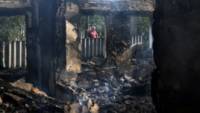
In an open appeal to Ukraine’s prime minister Yarseny Yatsenyuk, the parliamentary speaker and head of the SBU [security service], the Kharkiv Human Rights Group has called for urgent measures to evacuate all residents of areas where the authorities’ anti-terrorist operation is underway.
They point out that according to media reports, the anti-terrorist operation [ATO] in the cities of Slovyansk, Krasny Liman and other populated areas of the Donetsk oblast has entered an active phase. Grenade throwers and heavy artillery are being used, as well as military aviation. Despite all efforts by the Ukrainian authorities to avoid hurting the population, there have been cases where civilian buildings have been destroyed and there have been civilian casualties.
Since the Ukrainian military are blocking the above-mentioned populated areas in order to stop the terrorists from getting away, their residents, including families with children, are prevented from leaving territory engulfed by military action, and there are no conditions available, such as bomb shelters, to ensure people’s safety. There is a real threat to people living in these areas.
KHPG has received information from residents of areas where military action is underway reporting that they are unable to leave for temporary accommodation in other places during the ATO.
In view of the above-mentioned circumstances, we ask you to take all necessary measures to organize and carry out the evacuation of civilians from areas in the Donetsk and Luhansk oblasts wishing to leave.
The appeal is signed by Ludmila Klochko, Head of the KHPG Public Advice Centres and Gennady Tokarev, Director of the KHPG Centre for Strategic Litigations
The right to a fair trial
Russia’s FSB launches first Crimean show trial
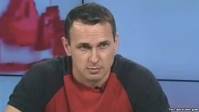
37-year-old Oleg Sentsov, renowned Ukrainian film director, solo father of two, EuroMaidan activist and staunch opponent of Russia’s annexation of the Crimea is accused of master-minding an alleged ’Right Sector terrorist’ plot
Five days after Ukraine’s presidential elections gave the lie to Moscow’s claims of a far right ‘junta’ in which the nationalist Right Sector is lead villain, four Crimean opponents of Russian annexation, one a prominent film director, have been accused of a Right Sector ‘terrorist conspiracy’. Despite an absurd plot and serious miscasting of all suspected conspirators, the first reports on Kremlin-loyal TV channels suggest that a Crimean show trial is being staged.
On May 30 Russia’s Federal Security Service [FSB] finally revealed details about the charges they plan to bring against four Crimeans, at least three of whom have been active in peaceful protest against the Russian annexation of the Crimea. It claims that film director Oleg Sentsov; civic activist Alexander Kolchenko; lawyer Gennady Afanasyev and Alexei Chirny are members of a Right Sector ‘diversionary terrorist group’. Their main aim, or so the FSB version goes, was to carry out ‘diversionary-terrorist’ acts in Simferopol; Yalta and Sevastopol, and in the last of these to destroy a number of buildings, railway bridges and power lines.
There is no elaboration on the alleged plans to destroy buildings, etc in Sevastopol. The FSB asserts that the men were planning bomb attacks during the early hours of May 9 [Victory Day] near the Eternal Flame and a Lenin monument in Simferopol. They are also accused of arson attacks on the offices of the civic organization “Russian Community of the Crimea” on April 14 and the United Russia party offices in Simferopol on April 18. There were no terrorist acts and the only action known to have even taken place was that on April 18 when one Molotov cocktail was indeed thrown into the United Russia offices.
The FSB claim that searches carried out in the homes of the suspects found: ‘explosive substances; firearms; ammunitions; canisters with inflammatory liquid; construction masks (similar to those used during the disturbances on Maidan); respirators; gas masks; aerosol cans with paint; nationalist symbols, etc.”
37-year-old Sentsov is raising two young children by himself, making the suggestion that the FSB found such items in his home preposterous. 23-year-old Kolchenko is a left-wing anarchist who has been in conflict with nationalists in the past, and is seriously miscast as a Right Sector ‘terrorist’.
As mentioned, the FSB state that charges will be laid in the near future. Why they have not been so already is curious if the ‘confessions’ they claim the suspects to have made are genuine.
The Committee on Aid to Crimean Political Prisoners has called the FSB accusations “absurd and an affront to common sense”. They view the arrests as linked to the men’s peaceful protest against the annexation of the Crimea and aimed at deterring all Crimean residents who oppose “separatists having seized the power on the peninsula”.
Afanasyev, a law graduate working as a photographer, was seized in the afternoon of May 9 on the street in Simferopol and taken to the FSB office. Sentsov was detained in his own home during the night of May 10-11 ; Kolchenko – again on the street on May 16. It is not known when Chirny was arrested, but according to journalist Kateryna Sergatskova, there seems to have been no contact with him since May 27. Sergatskova cites his VKontakte page which is the only information about the fourth suspect. This is especially interesting since, judging by that social network page, he is the only one to show any support for Right Sector. Both Sentsov and Afanasyev were active supporters of EuroMaidan. They and Kolchenko all took part in protests against Russian occupation and none has taken on Russian citizenship.
The FSB report was fairly dry and short on detail. Not so the treatment on Russian TV channels which have once again demonstrated a worrying level of collaboration with the enforcement bodies and little concern for accuracy. Channel One entitles one report “Right Sector saboteurs’ plans to carry out terrorist acts on Victory Day have been foiled” and claims – in support of this version but contrary to fact - that the men were arrested at the beginning of May.
Sentsov and Kolchenko deny all charges, however Afanasyev and Chirny are shown ‘confessing’, for example, to having received instructions from Sentsov. All four men are in Moscow’s Lefortovo remand prison and contact with lawyers has been very difficult. It seems extremely likely that the two were placed under physical or psychological pressure to give ‘confessions’.
A specific and worrying feature of all the Russian TV reports is the focus on Sentsov whose active participation in the AutoMaidan movement [linked with EuroMaidan] is stressed.
These arrests aroused scepticism from the outset due to the lack of any substantiation for the accusations of terrorism and the involvement of the first three detained in peaceful opposition to the annexation. The latest developments only confirm these suspicions. Right Sector has been consistently demonized by the Kremlin and Russian propaganda, and its role, both in the EuroMaidan movement and in the interim administration, wildly exaggerated. An attempt by the same First Channel to claim that the Right Sector candidate had gained the largest number of votes on May 25 coincided with exit polls suggesting (accurately, as it turned out) that the RS candidate, Dmytro Yarosh had gained less than 1% of the votes.
The FSB has threatened that more arrests may follow and thus far the whereabouts of three other civic activists from the Crimea remain unknown. There are serious grounds for believing that these arrests and the disappearances are politically motivated with opponents of Russian rule targeted. It also seems gallingly clear that in 2014 Russia’s security service, aided and abetted by Kremlin-backed Russian media, are attempting a remake of the Stalinist show trials, with Right Sector and EuroMaidan as key villains.
Freedom of conscience and religion
FSB looks for ‘extremists’ in a Crimean school

In the latest of a series of affronts and infringements of the rights of Crimean Tatars under Russian occupation, a madrasa or Muslim school in the Crimea has been subjected to a long search by armed and masked men, seemingly from the FSB.
The 13 children were fast asleep when masked men in camouflage and waving machine guns burst into the school in the village of Kolchugino outside Simferopol at around 6 a.m. on Tuesday morning. They made their way in without providing any identification or court order and began searching everything, breaking down doors and smashing windows in the process. Representatives of the Spiritual Directorate of Muslims of the Crimea who arrived on news of what was happening were told that the search was being carried out in accordance with a court order due to suspected ‘extremism’ and possession of weapons.
No weapons were found. No extremism either, although the term in Russia under the present regime of Vladimir Putin has become so vague and elastic that what they expected to find in the school is anybody’s guess.
A few of the men had the word Berkut [from the Ukrainian special force disbanded after they played a major role in repressive measures during EuroMaidan] on their camouflage gear, but otherwise there was no indication of who these armed men were. They appear to have been from FSB together with local police.
The madrasa students were understandably terrified by the appearance of men with automatic weapons. According to 15-year-old Emir, “two men ran into the room with Kalashnikov rifles and began asking who was the oldest. Then they ran into the next room and through the window aimed a gun at one of the students. They demanded that he open the door. The student opened the window, then they ran into the room and ordered us to sit quietly. They left us in the rooms and went to [the deputy director]. “
The children’s mobile telephones were taken away meaning that the children were unable to even contact their parents. Radio Svoboda’s Crimea site reports that Ali Aliev, the father of one of the students had come to visit his son. Instead he found a police car and buses with armed men, and could not get any answer as to what was happening. One of the armed men advised him to think about what his son was being taught there. He answered : “Do you read the Bible? We also read the Bible, as well as the Koran. It is all God’s word. There is nothing prohibited here”
Masked men also burst into the building where senior teacher Aider Osmanov lives with his wife and their two small children (a 4-year-old daughter and 11-month-old son).
A representative of the local Mejlis, Aziz Sadykov was permitted into the madrasa to ensure that the children were safe.
The search by armed men of a school lasted around 5 hours with even the children’s personal belongings looked through. After finding nothing at all suspicious, the FSB took several computers away, together with Osmanov who was interrogated for about an hour and a half before being released.
The Spiritual Directorate sees the action as a demonstration of force. Parents of the students are outraged and consider the visitation an insult to the religious sentiments of Crimean muslims.
Such measures, they warn, could lead to an outbreak of inter-ethnic and inter-faith conflict in the Crimea. One of the parents told Radio Svoboda that they feel insulted as the indigenous population, as Crimean Tatars and as Muslims that they are being treated like enemies. “We are a tolerant people, we have always lived at peace with everybody. There have been churches and mosques side by side. It’s insulting”.
Said Ismailov, Mufti of the Spiritual Directorate of Muslims of Ukraine [UMMU] warns that over the last 10 days there have been a number of articles in the press and a press conference where members of religious and civic organizations, as well as “guests from Russia” claimed that a form of Islamic extremism had appeared in the Crimea, supported and financed by Ukraine.
Entirely unsubstantiated accusations of ‘extremism’ have been heard over the last months. As reported here, searches were carried out in May of the home of veteran Crimean Tatar leader Mustafa Jemiliev, who has himself been banned entry to his homeland; member of the Mejlis of the Crimean Tatar People Ali Hamzin, and around 150 Crimean Tatars. The latter were reportedly suspected of ‘extremism’ because they wear head scarfs and often visit the mosque.
The vast majority of Crimean Tatars were from the outset against Russia’s annexation of the Crimea. At the beginning of June, the Chief Editor of Avdet, the newspaper of the Mejlis of the Crimean Tatar People received a formal warning over what the occupation regime’s prosecutor called ‘propaganda of extremism’.
The specific examples given appear to have involved using terms like ‘annexation’ and ‘occupation’. Extremism it would seem can often be a synonym for disagreement with Russia’s actions which are rightly called annexation far beyond the Crimea.
Freedom of expression
Kaliningrad FSB finds ‘deep offence’ in a German flag
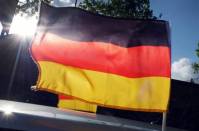
Three men are in detention in Kaliningrad and could face long sentences over a peaceful protest in which they raised a German flag. Russia’s prosecution of the three is particularly incongruous given how vociferously Moscow has asserted the right of so-called separatists in the Crimea and eastern Ukraine to seize official buildings and raise Russian flags. Silence from Ukrainians is also baffling especially since the three were no secessionists, but were protesting against Russia’s invasion of the Crimea.
Moscow’s excuses for invading and annexing the Crimea in February and March this year prompted analysts to predict copycat claims from other countries eager to also ‘regain’ territory they believed to be historically theirs. Whether due to the legacy of World War II, or because of strong business ties between Germany and Russia, Kaliningrad was seldom mentioned, although Königsberg was only occupied by the USSR and renamed in 1945.
It was in Kaliningrad early on March 11 that a German flag was modestly placed in a glass on the garage of the regional office of the Russian Federal Security Service [FSB]. If there was an accompanying protest, there are no photos, and no witnesses.
What is known, however, is that three men were arrested and could now face up to 7 years imprisonment. According to Natalya Zotova writing for Novaya Gazeta, the men are charged with group hooliganism supposedly carried out according to prior conspiracy. The charges, she notes, are the same as those brought against members of the Pussy Riot punk group.
The three activists – Oleg Savin and Mikhail Feldman from a local group called the Public Defence Committee, and a friend from Moscow Dmitry Fonaryov are in custody in Kaliningrad. They deny any wrongdoing and have refused to give evidence. They have, however, corresponded with Zotova and explained that their act was in no way suggesting that Germany should take back Kaliningrad. They were only trying to demonstrate that if in the Crimea you can simply raise the flag of a foreign country, why not elsewhere? Feldman explains that they were pointing to the double standards whereby Russia officially approves of Russian flags being flown in another sovereign state, yet if a foreign flag is raised over Russian territory, this is seen as a crime.
And punished. At first the men just ended up jailed for 10 days (Fonaryov for 25) over supposedly using foul language, a standard formulation used against activists. It is not clear whether a criminal prosecution was always planned, and the original milder penalties used just in case of international outcry, or whether the FSB later decided that a show trial was needed to deter others.
The indictment states that the protest incited separatist tendencies and was also “deeply offensive to the political orientation of Russian Federation citizens”. Perhaps the silence from the press in Germany is linked with trying to understand whether it is specifically a German flag that is ’offensive’, or any foreign flag.
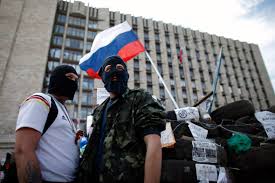 Kremlin-backed militants make their allegiance clear
Kremlin-backed militants make their allegiance clear
Russia’s President Vladimir Putin has been insisting for months now that the pro-Russian and heavily armed militants who have seized control of official buildings and even some cities in eastern Ukraine are fighting for their legitimate rights. These rights, he appears to believe, include hoisting up Russian flags over official Ukrainian buildings and calling for Russian military intervention.
The FSB have discovered that Fonaryov once held far-right political views and is accusing him of having shouted “Heil Hitler” outside the FSB building and raised his arm in a Nazi salute. There are no independent witnesses and no photos, so the FSB can say what they like. The accusations should, however, be credible. If Fonaryov could have suddenly reverted to long-abandoned right-wing views, it is simply preposterous to imagine Feldman, who is Jewish, having ‘entered into conspiracy with him.
The charges against the men could be worse. According to a new Russian law that came into force on May 9, any calls for Russia to stop violating Ukraine’s territorial integrity and for action against the Russian annexation will face penalties ranging from a steep fine to 5 years imprisonment if such calls were published in the media or Internet. We are talking here of precisely those calls, backed with Russian mercenaries, tanks and arms, which are being made by Kremlin-backed militants in eastern Ukraine.
It would be helpful if foreign diplomats and media could seek some clarity from Putin or Foreign Ministry representatives. Why are armed militants seizing Ukrainian local government buildings and hoisting the Russian flag to be treated as freedom fighters, while three unarmed men in Kaliningrad are in custody and could face a few years in prison for a peaceful protest involving a German flag?
The argument that the answer is so clear as to make the question redundant will not wash. The reason why no country will do more than protest over the arrest of three Russian nationals on Russian territory is indeed clear, though not why there has so far been near silence. Failure to do little more than protest when Russia flouts all rules of international law in Ukraine can only strengthen the Kremlin’s view that it can do what it likes ‘in its backyard’. Three men in Kaliningrad thought that unacceptable. They’re paying for it, but were undoubtedly correct.
Cynical propaganda mileage from journalist’s death
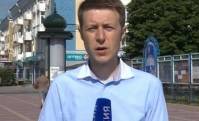 Igor Kornelyuk
Igor Kornelyuk
Journalist Igor Kornelyuk and sound engineer Anton Voloshin from the Russian state-owned TV channel Rossiya 24 are reported to have been killed on June 17, after being caught in mortar fire not far from Luhansk. In sadness and sympathy for their families all are united. In little else, unfortunately, and the uses already being made by Moscow and the Russian media to present Russian journalists as heroic defenders of the truth make clarification necessary.
Ukraine’s President Petro Poroshenko has, at the request of OSCE, instructed that an investigation be made into the deaths. The Russian Foreign Ministry and media have clearly decided that they know who the ’culprits’ are without investigation.
Russia’s Foreign Ministry claims that the journalists came under fire in a place where there were no military targets although what this means in the present conflict against heavily armed militants is less than apparent. The channel itself states that they were near a militant checkpoint and that the ‘self-defence’ [otherwise known as Kremlin-backed insurgents] were trying to get a group of civilians out of the danger zone. The Ukrainian anti-terrorist operation and SBU assert that the military came under attack from militants. They also refute the channel’s claim, and say that the journalists were in camouflage gear without any way of distinguishing them from the militants.
The Russian Foreign Ministry is categorical in asserting that the tragedy is yet more proof of “the whole criminal nature of the forces who have unleashed a punitive operation in the east of Ukraine as a result of which civilians are continuing to die”. “We are proud of all journalists who …. are courageously bringing the truth about the real events in Ukraine. It is precisely this truth that is feared by the Kyiv authorities and the various paramilitary formations which have imposed real terror against journalists from Russia.”
Rossiya 24 takes the same line, blaming the Ukrainian authorities and army. It clearly suggests, both in its main report and in an article on the site that “Russian journalists in Ukraine have become the target which the Ukrainian forces, the Ukrainian authorities are hunting”. It is the Ukrainian authorities, the channel’s correspondent claims, who are seeking escalation of the conflict in the east of the country. Through Tuesday evening, various pro-Kremlin TV channels repeated allegations that the military must have known that they were "shooting unarmed journalists". With the unrelenting barrage of such claims, as well as similar hype from many Russian politicians, Russian viewers could easily come to see Russian intervention – in defence of the truth, of course – as the country’s sacred duty.
A particularly disturbing note comes from Aram Gabrelyanov, head of the MediaNews publishing holding. “We need to understand that all of us journalists are at war with the fascists. The fascists are carrying out genocide of their own people, and are trying to kill us journalists so that we don’t tell the truth, that they are killing ordinary people and civilians. “
“We Russian journalists”, he says, will not be cowered, and will continue telling the truth about what these fascists, real scum, are doing. Russia’s President, he hopes, will use his power and force to influence these same ‘fascists’.
“I don’t believe that western media will show any solidarity. I believe that we here must unite – both journalists and the Russian public and show that we are a strong country and strong society who will try to not let anybody be badly treated.”
On this stirring but rather chilling note given Russia’s claimed right to ’protect’ its own citizens, including with military force, in any country, it would be well to consider the ‘truth’ that Rossiya 24 and other Russian media are supposedly telling.
Kornelyuk’s last report on Monday claimed that “in the village of Shchastya the punitive forces have killed almost the entire local population”. The most charitable assessment of the news item would be that the journalist ignored the principles of balanced and objective reporting. Only the militants, described in positive terms, as fighters of a people’s militia army, and representatives of a ’people’s republic’, are heard, meaning that the claims that a mass purge by Ukraine’s military is underway, that “the civilian population is being killed, women and children, everybody – from 16 to 50” will be received by the viewers as undisputed fact.”
The head of the Information Resistance group, Dmitry Tymchuk is more forthright. He asserts that both Kornelyuk and Voloshin were in Ukraine illegally and that they were there to provide information backing, effectively propaganda for the pro-Russian militants.
Whatever the truth about the two men killed, the role of truth-bearer attributed Rossiya 24, LifeNews, Zvezda and other channels is less than plausible. On May 16, for example, Rossiya 24 used footage from the North Caucuses in 2012 as supposed evidence of atrocities by the Ukrainian military in 2014. On June 9 LifeNews claimed, without any justification, that the village of Semenivka had been razed to the ground by the Ukrainian forces. Three days later Rossiya 24 and LifeNews used video footage from Iraq in 2004, claiming it to show Ukrainian use of illegal phosphorous bombs in Semenivka. The list of such examples based on fake ’evidence’ or claims by one party to the conflict is long. Such deliberate attempts to mislead the viewer are regularly exposed by the NGO Stopfake and western media, although Russia’s Foreign Ministry continues undeterred to present them as further evidence of Kyiv’s ’crimes’.
The close coordination evident between the Kremlin and most Russian media, the same supposed villains and heroes and general narrative have very little to do with real journalism. Even less do they have in common with the truth.
The right to health care
Crimea’s Methadone Ban hits Rehabilitation Patients hard
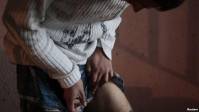
As many as 20 people who were being treated for heroin addiction in the Ukrainian region of Crimea have died since the Black Sea peninsula was annexed by Russia in March.
Dozens more have left the region for other parts of Ukraine in a bid to continue methodone treatment. The heroin-replacement therapy, which is widely used in the West, is considered ineffective by Russian health specialists and is banned in that country.
Crimea’s de facto authorities claim heroin addicts have been taken care of since Moscow took over.
"Nearly 700 people have been taken off replacement therapy and about 60 are being treated in health-care facilities, " says Sergei Donich, a former regional health minister and currently deputy prime minister in the region’s de facto government, tells RFE/RL.
"The next phase is work with psychiatrists and public organizations which will help ensure these people do not return to their pernicious way of life."
But according to Ukrainian sources, more than 800 addicts were undergoing methadone treatment in Crimea before the annexation. Many of them were also suffering from other diseases, including HIV/AIDS, hepatitis C, and tuberculosis.
"The deaths of tens of people were identified in a report by an international mission of the European Commission at the end of May, " says Pavlo Skala, of the International HIV/AIDS Alliance in Ukraine. "We are talking of, at least, 20 patients."
’Thinking Of Suicide’
For his part, Donich denies that anyone has died and says the patients suffering from other diseases are getting "proper medical care."
"There have been no lethal outcomes, " he said.
Olena Kucheruk, an activist with the Kyiv-based NGO "Rebirth, " says her organization has been able to find financing to send 57 patients from Crimea to other parts of Ukraine to continue their methadone treatment.
RFE/RL’s Ukraine Service spoke to one of them, a young woman in her twenties who asked to be identified only as Oksana.
"When I learned that our program was being shut down in Crimea, it was a huge shock for me, " Oksana says. "I didn’t know what to do and was hysterical. The only possibility for me was to move to Kyiv and continue my treatment here."
She says that she knows other Crimean patients who haven’t been so lucky.
"Many of them are thinking of suicide, " she says. "And several have already tried. There is no way out for those who are still there."
Activist Skala says closing down Crimea’s methadone program has led to an increase in drug trafficking on the peninsula, criminal activity that he suspects is protected by corrupt police officers.
De facto Crimean Deputy Prime Minister Donich, however, says that methadone treatment is not effective.
"The money and interests of pharmaceutical firms stand behind it, " he says.
Leonid Vlasenko, a Kyiv doctor who specializes in narcotics treatment, says replacement therapy helps "a large number of people, " in part because it keeps them from engaging in illegal activities and enables them to seek treatment for their other health problems.
"Studies show that people receiving this treatment live longer, are sick less often, and are more socially adapted, " Vlasenko says.
http://rferl.org/content/crimeas-methadone-ban-hitting-rehab-patients-hard/25429665.html
On refugees
KHPG statement on the adoption of a law on internally displaced persons
Draft law No. 4998-1 was tabled in parliament on June 19 and adopted that same day in full, this meaning with serious infringements of the regulations. Such haste could be explained by its particular urgency, however unfortunately it does not on the whole resolve the problems of forcibly displaced people. There was no public discussion of this draft law and the recommendations of the UNHCR on the crucial provisions in such a bill were ignored. It is baffling why MPs Valery Patskan and Serhiy Sobolyev rejected draft law No. 4998 on the same subject, tabled by them on June 17 together with Volodymyr Aryev. That draft law, in our assessment, was much better at considering the rights and legitimate interests of people forcibly displaced.
The law only covers forced migrants from the Crimea, Sevastopol and the anti-terrorist operation [ATO] zone. This means that if there should be forced migration, for example, as a result of a terrorist attack outside the ATO zone, the law will not cover people displaced from that territory. In this sense the law is short-sighted.
The explanatory note states that the adoption of the draft bill does not require additional spending from the State Budget. This suggests that the legislators do not want to concern themselves with those forcibly displaced at all, and want them to be looked after by international organizations, charities and the Ukrainian public alone.
According to Article 3.13 a person can be refused a document certifying that they are displaced if:
a. there are no warranted grounds for forced evacuation from one home on territory stipulated in Article 1 § 2 of this law;
b. the authorities have information about:
the person having committed a crime against peace and humanity; the constitutional order or Ukraine’s territorial integrity;
participation in unlawful actions, as per international law and current legislation, on temporarily occupied territory or territory where an anti-terrorist operation is underway.
(a) means that the onus is placed on a person to prove that they left their home “on the territory of Ukraine as a result of circumstances which place the person’s life and health in jeopardy, or that of their family, the loss of accommodation, means (sources) of existence; the threat of the use of force, persecution for political, religious convictions, ethnic origin or belonging to certain social groups, or in order to avoid the consequences of armed conflict or occupation, widespread demonstrations of violence, rights infringements, and where the person has not crossed an internationally recognized state border.
The principle in item (b) will seriously complicate the procedure for receiving a document confirming that a person is a forced migrant and thus specifically “creates the risk of corruption infringements” and the grounds for large-scale refusals to provide such a document.
This could mean that the State Migration Service [SMS] will have to ask for information from the Interior Ministry and SBU to check out people seeking enforced migrant status. This in general poses a danger to the life, health and property of people displaced since such information requests will go to the law enforcement bodies on territory from where the person has come, and could therefore fall into the hands of the terrorists.
Item (b) may be placed only in a provision about the grounds for stripping a person of forced migrant status, not in provisions about refusing to provide the document.
Under the present law it is the SMS which is responsible for enforced migrants. This reflects the philosophy behind this law: the state gives more importance to keeping records and following migration of displaced persons than to providing them with help. If the main aim of the law is to provide people who as the result of forced migration find themselves in a difficult social situation, then this means that the Ministry of Social Policy should look after them.
No procedure is set out for registration of place of residence under which the displaced people retain their old registration and are thus able to enjoy all rights and legitimate interests.
No help at all is provided with accommodation if the forced migrants themselves choose the region and the place of residence is not included in the list of regions set out by the Cabinet of Ministers for temporarily putting forced migrants. The government could thus deprive most displaced people of help with accommodation since the people want to work according to their profession, study and integrate in a new environment.
The above does not, unfortunately, exhaust the list of failings of the law and threats to people’s rights resulting from its adoption. The law in general does not achieve the aim of providing effective help to people internally displaced.
We recommend that a draft law with amendments and supplements to the law be drawn up and passed at the next plenary session of the Verkhovna Rada.
Yevhen Zakharov, Director of the Kharkiv Human Rights Group
Law on Internally Displaced people comes in for criticism
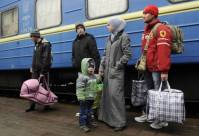
On June 19 parliament finally adopted a much-needed law on the legal status of people forced to leave their homes in the Crimea or in areas of conflict in Donbas. According to lawyer and civic activist Alexandra Dvoretska, the government is showing no intention of spending a penny on helping people displaced from the Crimea and East of Ukraine.
She believes that the law was adopted with the same fatal infringements as the notorious anti-protest laws of Jan 16. The law passed, she says, was not that which had been discussed, and that the text of the draft bill was only tabled on the day that it was voted on. One of the authors of the bill and head of the parliamentary committee on human rights, Valery Patskan [Udar party], she asserts, discussed an entirely different bill with members of NGOs and international institutions just the day before, on June 18.
With respect to the infringements in procedure, Dvoretska notes that the draft bill had not been worked on by any of the committees, and should not have been tabled without an assessment from the main committee. If this was a bill requiring urgent adoption, as per Article 101 of the Verkhovna Rada regulations, then it needed a decision from the President and Verkhovna Rada to fast-track consideration.
The author points to a telling discrepancy. The authors of the bill, Patskan and Serhiy Sobolyev [BYUT] assert that adoption of the bill will not require additional spending from the state budget.
Article 5.6 however states that money for the measures envisaged by the law will be taken from the state or local budgets according to procedure stipulated by the Cabinet of Ministers. So will the latter simply not stipulate any procedure for providing the assistance which the law guarantees?
The author also disputes the claim made in the explanatory note that the bill contains no rules or procedure that could lead to corruption. She points out that the procedure for receiving status of forced migrant and the possibility of being deprived of this status are entrusted to the same body – the State Migration Service, with this same body also determining who receives social assistance and help with accommodation, including by suggesting places. If the person rejects the proposed place, the bill (Article 3.3) states that s/he is deemed to not need state assistance with accommodation.
Dvoretska believes that this creates fertile ground for corruption, with officials being able to reap benefit out of the fact that places in cities where there are better chances of finding work, better schools for their children, medical care, etc., will be most sought-after.
Article 6 refers to ensuring the right of forced migrants to receive or reinstate identifying documents, as well as those confirming the right to pensions, social insurance, etc. in accordance with the law on ensuring the rights of citizens and legal regime on temporarily occupied territory. This, Dvoretska notes, does not cover people from eastern oblasts.
“This law does not resolve even 10% of the problems encountered by people who’ve ended up on occupied territory or in zones where anti-terrorist operations are underway”.
The law does not envisage humanitarian aid for people in those areas; it does not ensure their evacuation; does not mention the creation of humanitarian corridors; the provision of urgent medical and psychological assistance. It also fails to resolve urgent issues linked with unblocking bank accounts.
Even the terms do not correspond to those in international documents where it is customary to speak of internally displaced persons.
The author accuses the government of once again deceiving its citizens and adopting laws in breach of the Regulations, without public participation, lying and not trying to find out the needs of one fifth of the population.
Help for Forcibly Displaced People
As a result of the occupation of the Crimea, from March to May more than 10 thousand Crimeans came to mainland Ukraine, and the number of such forcibly displaced persons is increasing. Last week (from 8-15 June) tens of thousands of people from Donbas came to Kharkiv, Dnipropetrovsk, Odessa, Kherson ad other regional centres of the East of the country, after fleeing their homes in zones of military action in fear of their lives.
This category of people is referred to in international law as ‘internally displaced persons’ [IDP’. The problems with providing IDP with accommodation; social, medical and other assistances are being resolved at the present time by civic organizations and informal groups of members of the public, as well as by city and local self-government authorities. There are varying levels of coordination for this assistance, however experience so far makes it possible to formulate IDP main needs. These are in the first instance accommodation; food; clothing; medicine and medical care; help finding work. All of this work is being carried out on a voluntary basis. Sometimes there is a need for direct financial assistance however since it is not always possible to establish the real need for this, volunteers try to avoid such situations and offer help in material, not pecuniary form. The following are some of the groups of volunteers and information about the results of their work.
The first systematic help to IDP began in Lviv where more than three thousand Crimeans, mainly Crimean Tatars, were received. This was carried out by the artistic association ‘Dzyga’.
In Kyiv a number of groups and organizations active during EuroMaidan united as a “Volunteer Sotnya’* to help IDP [Vostok [East] SOS; No 17 Hospital; the Maidan Rehabilitation Centre; Ruslana and the Ruslana Lyzhychko Fund; the Coordination Centre for Displaced Persons; the Escadron of Good; etc). Here the work was coordinated of all groups of volunteers involved in organized evacuation of people from Donbas (from 10 to 800 IDP in each case). They were then provided accommodation together in hostels; former pioneer camps; pensionnats, etc. A coordinator for each such place is appointed with the person responsible for resolving all problems arising. A storage facility has been opened for receiving humanitarian aid (clothes; medicine; everyday technology, food that can be kept for a long time; organized medical and psychological assistance; entertainment for children.
Just over the last week around 300 thousand UAH has been collected. The group has a closed facebook page, and a help line – 091 352 94 52.
In Kharkiv there is a an informal association of volunteer groups which coordinates all activities with the regional state administration. This includes the Telesense Centre; a computer technology college; several programmer teams; the Kharkiv Human Rights Group and other groups. A site has been opened http://keepua.org/, for communication and for resolving the problems of IDP – provision of accommodation; food; clothing; helping to find work; medical and legal aid; etc. A particular feature of Kharkiv is that 20 thousand school leavers from Donbas schools are coming here to take the external exams – ZNO – due in a week. People are put up mainly outside Kharkiv itself in former pioneer camps, pensionnats etc.
In Dnipropetrovsk IDP assistance is coordinated by the National Defence Headquarters created by the local EuroMaidan. The headquarters is in constant contact with the regional state administration. Here there are almost no places where people can be place in groups and volunteers work directly with each family of IDP who approaches them for help. The help line number is 067 698 65 64.
There are analogous associations in other cities (Odessa; Kherson; Kirovorhad and others) with their work on the whole like that described above.
The components of help to IDP everywhere are active participation by volunteers; registration of new arrivals; the creation of a storage point where local residents bring humanitarian aid (food which can be kept out of a fridge; clothes; general needs such as toothbrushes; soap, items of personal hygiene etc.; medicine; everyday technology; etc.); collecting money and calculating expenditure; public accountability for spending.
There is an urgent need for a law on IDP to be passed since it is hardly possible to resolve the problems of IDP which will only increase through volunteer efforts alone. Even if the anti-terrorist operation is successfully ending, and the IDP from Donbas can return home before the cold weather begins, the flow of people from the Crimea will only increase. A draft law, drawn up by KHP, and discussed by the public twice – in the office of the Human Rights Ombudsperson, and in the UNHCR Kyiv office, was used by MPs Serhiy Sobolyev; Valery Patskan and Volodymyr Aryev and tabled in parliament on June 17.
* [hundred – units who took part in Maidan; hence the term “Nebesna Sotnya’ or Heavenly Hundred for the well over 100 people who were killed, most gunned down on Feb 20 by police snipers – translator].






